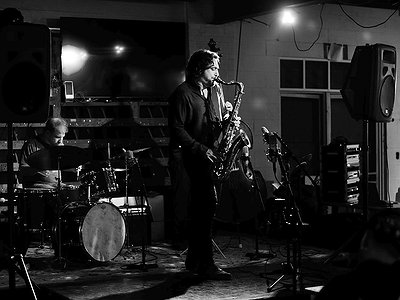Name: Noah Preminger
Nationality: American
Occupation: Saxophonist, composer, improviser, band leader
Current release: Noah Preminger teams up with Jeff Cosgrove on drums and Kim Cass on bass for Confusing Motion for Progress, out now.
[Read our Jeff Cosgrove interview about improvisation]
If you enjoyed this Noah Preminger interview, and would like to find out more about his music, visit his official homepage.
Some see instruments merely as tools towards creativity, others feel they go hand in hand. What's your take on that?
I think that the way we play each instrument enables us to create and explore in different ways.
When I play saxophone, I compose much differently than when I play the piano or clarinet. Each has a different palette that we get to work with, and with the different restrictions on each instrument it will tend to lead us in different directions.
The piano, for me, is where I tend to compose most often.
In the light of picking your instrument, how would you describe your views on topics like originality and innovation vs perfection and timelessness in music? Are you interested in a “music of the future” or “continuing a tradition”?
None of these concepts matter unless you're loving what you do. And if you love tradition and decide to stick more closely to that, then so be it.
Personally, I prefer to hear an individual voice, not a replica.
What was your first encounter with the saxophone? What was it about it that drew you in?
I auditioned for the drums in middle school, but they didn't accept me. The next hippest instrument seemed like the saxophone, so I went for that.
I was a bit of a loner in middle school, so it allowed for plenty of time to spend with the instrument.
Just like any other instrument, the saxophone has a rich history. What are some of the key points from this history for you personally?
Lester, Bird, Trane, Brecker. That's the 'greatest hits' of the saxophone.
When talking about electronic devices, we often think about their “features”. But the saxophone is a complex device, too. What are some of its stand-out features from your point of view? How would you describe its sonic potential?
I think there's a bit of a limit on what each instrument can sonically produce, but from time to time I still hear players that use the instrument in new, creative ways. Typically in the avant garde realm.
Instrument design is an ongoing process. Are you interested in recent developments for the saxophone in this respect?
I don't see a ton of innovation happening in the construction of saxes. I'm told this is due to the expense of producing the horn itself. I believe there's a 'mold' that most manufacturers use, then slightly tweak for their own branding.
I've tried mostly everything out there, to my knowledge, and still find my Selmer Mark VI to be the Don.
Tell me about the process of learning to play the instrument and your own explorations with it.
With the luxury of more time and less responsibilities, I put in an incredible amount of time on the instrument as a kid.
That said, I've always felt that playing music comes second to exploring life, and consider it more as my job, not my 'life's work'.
What are specific challenges in terms of playing the saxophone?
I struggle with the instrument all the time, specifically my consistency in tone due to environmental factors.
For this reason, reeds are a drag and unfortunately have the biggest impact on the performance.
How would you describe your personal style of playing the saxophone?
Passionate.
What does playing your instrument feel like, what do you enjoy about it, what are your own physical limits and strengths?
I wouldn't say playing saxophone is something I necessarily 'enjoy' anymore. It's my job and I show up each day prepared.
Although over the past decade I've tried to explore more risk and that's created a playfulness and, yeah, I guess some joy from time to time.
How, would you say, does the saxophone interact with other instruments from ensembles/groups you're part of?
We're typically the lead voice.
Although I've always wanted to hear a band where the roles were reversed. Bass becomes lead voice, with saxophone mainly as an accompanying instrument. Would probably sound like shit.
Are there other saxophonists whose work with their instrument you find inspiring? What do you appreciate about their take on it?
I hear every saxophone player in an educational way. Some educate me on tone, others with rhythm, harmony or articulation.
These things can sometimes lead to feeling inspired, but it's really more about shaping the sound I will have the next time I pick up the horn.




